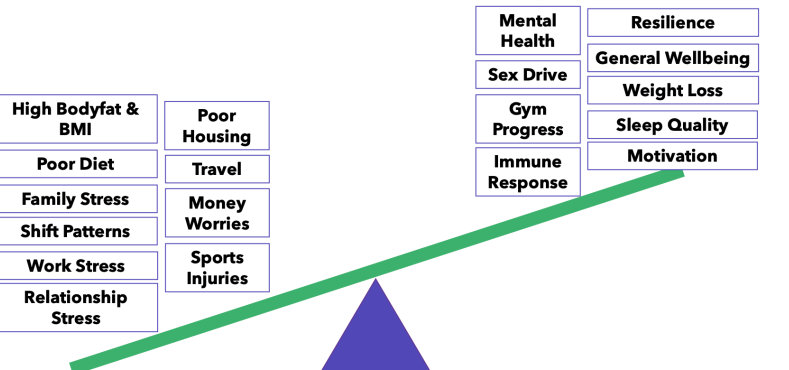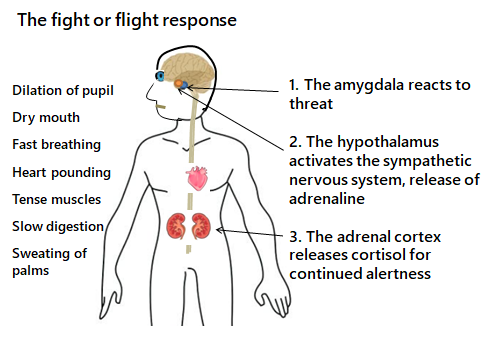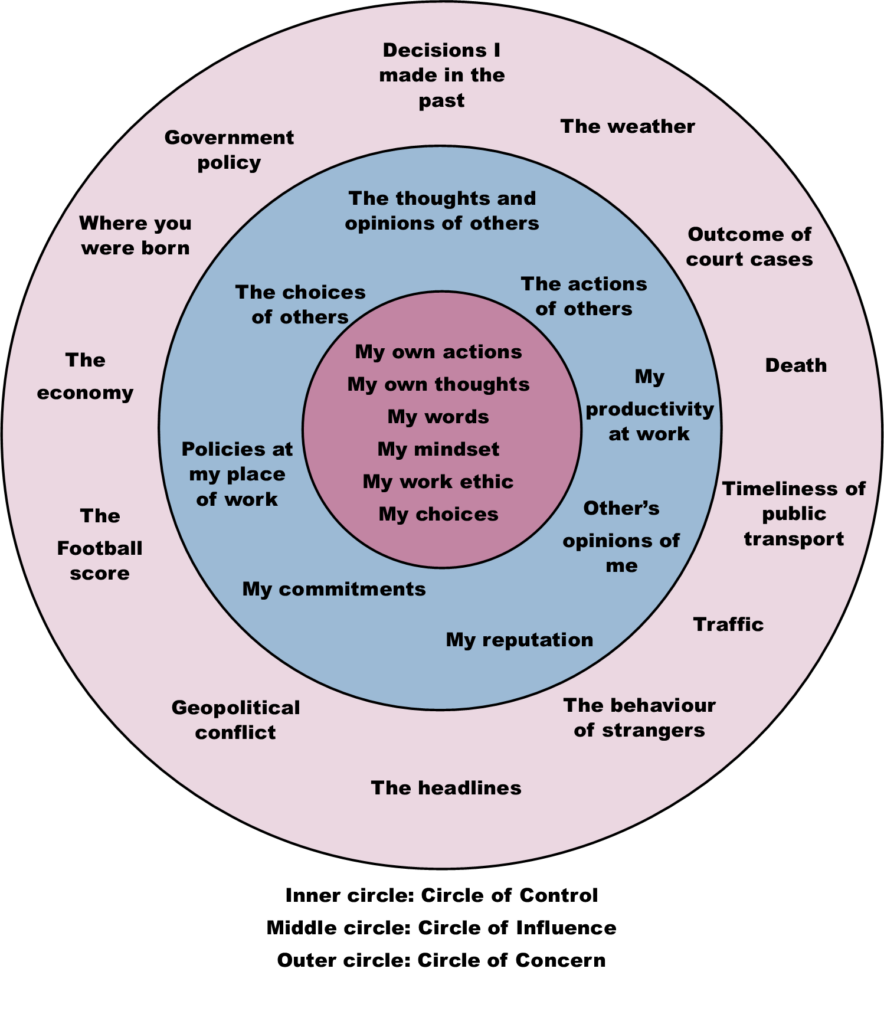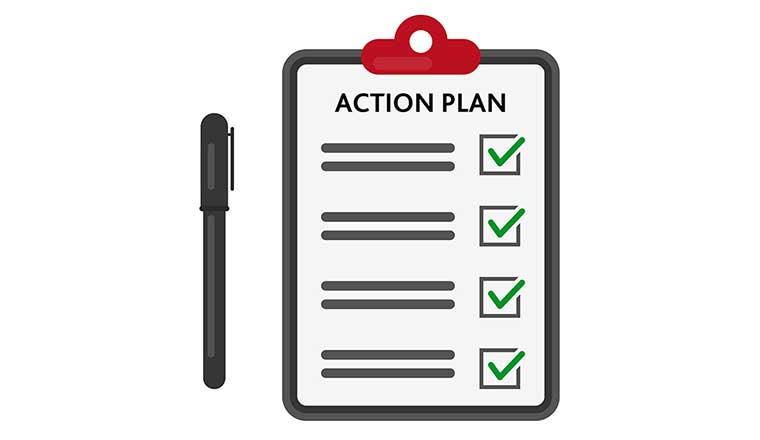Dr. Andrew Chappell PhD WNBF Pro
Stress the Killer of Progress
The body and the mind are intrinsically linked. A healthy body helps foster an environment for a healthy mind, while the opposite is conversely true. A well-balanced individual with low levels of stress is always in a better position to develop their body and reach their fitness goals compared with opposite. The example below illustrates this perfectly, we call this the allostatic load.

Stress is not a bad thing, in fact what we call stress is a perfectly normal thing and short, sharp, controlled spikes of it are often what we describe as fun. The changes that occur during acute bouts of stress are characterised by the normal physiological response to a threat. Think fight, flight or freeze, whereby your body releases cortisol a catecholamine responsible for mobilising fuel stores – which you need if you’re going to run away from a threat – epinephrine (adrenaline) which raises your heart rate, and blood pressure to prepare your bodies muscles for action, while the immune system, with metabolic actions like protein synthesis are depressed to save energy – again if you’re running from a lion, fighting infections is the last thing your body needs to be doing. Again similar things happen when you ride a rollercoaster or take part in exercise. The problem with stress is that when it’s chronic all these physiological responses still take place except these systems are constantly turned on, just with the volume turned down. Chronic stress combined with a poor lifestyle can kill think heart attacks in high stressed businessmen and less severe stomach ulcers or flare ups in autoimmune conditions like Crohn’s, Colitis, and Eczema. Illnesses aside, stress can ruin your mental health and your fitness progress.

Taking Back Control
In our lives, we often encounter situations and challenges that can either be: within our control; outside of our control but within our influence; or completely outside of our influence and merely a concern. One thing that really stresses people is the feeling of helplessness or a lack of control. It’s one of the reasons why people develop compulsive behaviours, self-harm or restrict their food intake in the case of eating disorders. These are things the individual can assert a degree of control over, even if they feel helpless in other aspects of their life. The aforementioned are extreme examples, but do serve to illustrate the point that understanding these circles of influence can help us better navigate and manage the various aspects of our lives, reduce stress, and improve our overall well-being.
The Circles of Influence
The concept of the Circles of Influence: was made popular by Stephen Covey in his book “The 7 Habits of Highly Effective People.” According to Covey, there are three circles that represent different areas of our lives:

Circle of Control: This circle represents the things that are directly within our control. These are the things that we can change, influence, or take action on. It includes our thoughts, emotions, behaviours, and actions. We have full autonomy over these areas and can make conscious choices to manage them effectively.
Circle of Influence: This circle represents the things that are outside of our direct control but within our influence. These are the areas where we can have an impact, albeit not complete control. It includes our relationships, our work environment, our community, and other external factors that we can influence through our actions, communication, and behaviour.
Circle of Concern: This circle represents the things that are outside of our control and influence. These are the areas that we may have worries or concerns about, but we have little or no power to change them. It includes global events, natural disasters, other people’s actions or decisions, and other factors that are beyond our sphere of influence.

How do you Manage the Circles?
Managing the circles of influence involves recognising and understanding the different areas of our lives that fall within each circle and taking appropriate actions to effectively manage them. Here are some strategies for managing each of the circles
Circle of Control
Focus on self-awareness: Be mindful of your thoughts, emotions, behaviours, and actions. Recognise that you have control over these areas and take responsibility for managing them effectively. It’s important to realise that our emotions can betray us, and that emotional reasoning can lead us astray.
Set clear boundaries: Establish healthy boundaries and prioritise self-care. Learn to say no when necessary and allocate time and energy to the things that matter most to you. This is one of the biggest problems I come up against when working with clients. A lot of people are keen to people please and as a result they always say yes and end up not giving themselves any time for themselves.
Develop healthy coping strategies: Learn and implement healthy coping strategies, such as relaxation techniques, exercise, self-reflection, and self-care activities, to effectively manage your thoughts, emotions, and behaviours. It doesn’t matter what you do, but a hobby where you can switch off and give yourself a rest from day-to-day worries are important. They’re far better than drinking a bottle of wine to help you deal with the stress. Using breathing techniques in acute situations, going for walks, doing a puzzle, cooking, or seeing or speaking to friends are all helpful.
Circle of Influence
Identify areas of influence: Reflect on the areas of your life where you can have an impact and act. This may include your relationships, work environment, community involvement, or other external factors that you can influence. Be realistic though remember not everything is going to be within your sphere of influence.
Build positive relationships: Cultivate positive relationships based on trust, respect, and effective communication. Collaborate with others and leverage your influence to create positive change. You won’t be able to build relationships with everyone, some people might not be interested, don’t take it personally though. Remember relationships offer opportunities.
Take initiative: Be proactive and take the initiative to make a difference in the areas that fall within your circle of influence. Identify opportunities for improvement and take action to create positive outcomes. Taking responsibility is important if you see an opportunity to do something go for it.
Circle of Concern
Practice acceptance: Recognise that there are some things that are beyond your control and influence and learn to accept them as they are. Worrying or stressing over things that you cannot change will only drain your energy and increase your stress levels. For example, it’s more likely that big job initiative or government programme was created at an executive level so don’t things personally.
Focus on what you can control: Instead of dwelling on things that are outside of your control, shift your focus and energy towards the things that you can control or influence. This may include acting on issues that are directly related to you or your immediate surroundings. You don’t need to be an activist, but being the best version of you is definitely a positive outcome.
Take positive action: While you may not be able to change the situation, you can still take positive action. This may involve finding ways to cope with the situation, seeking support from others, or advocating for change through appropriate channels. This might also mean practicing self-care or again, discussing issues and gaining perspectives is helpful.
Practice self-care: It’s important to take care of yourself, especially when dealing with concerns that are outside of your control. Engage in self-care activities, such as exercise, meditation, spending time with loved ones, and engaging in hobbies or activities that bring you joy and relaxation.
What Happens Next?
As I always say to my clients, doing the same thing repeatedly and expecting things to change is the first sign of madness – “Albert Einstein”. If you want things to be different you have to try something different. Understanding this article and the circles of influence is one thing, however if you don’t do anything post this article to change your thought processes then nothing will change. So, start by creating an action plan. What you’re going to do differently? What things are you worried about, are they in your circle of control, influence or concern? Are you practicing self-care and do you have coping strategies? By focusing on our circle of control, leveraging our circle of influence, and practicing acceptance and self-care with regards to our circle of concern, we can cultivate a sense of empowerment, resilience, and well-being.

Remember, while we may not have control over everything in life, we do have control over how we choose to respond and act in the areas that are within our sphere of influence. Implementing these strategies can significantly reduce our levels of stress and help us reach our fitness goals. As Always if you think we can help you at ProPrepCoaching, then follow the link to the sign up today (https://proprepcoaching.com/sign-up/)
